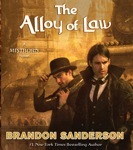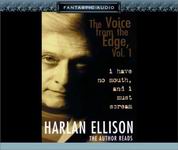
 The Alloy of Law: A Mistborn Novel
The Alloy of Law: A Mistborn Novel
By Brandon Sanderson; Read by Michael Kramer
11 hours – [UNABRIDGED]
Publisher: Macmillan Audio
Published: 2011
Themes: / Fantasy / Magic / Allomancy / Feruchemy / Series / Mistborn /
Ed. – Welcome to Jeff Miller (aka The Curt Jester) to the pages of SFFaudio! This is his first review for us.
Having just finished reading the Mistborn trilogy I was delighted to see that a new novel in the Mistborn universe is about to be released. The world-building, plotting, and characters of the original trilogy got me hooked and there is plenty of potential for new books in the same universe.
The original series is epic fantasy with elements of Tolkien eucatastrophe. The Allow of Law is a standalone novel with a different feel to it. It takes place 300 years after the events of The Hero of Ages. The cultural stasis that had been maintained by the Lord Ruler has fallen apart and Scadrial is approaching a more modern age reminiscent of the turn of the 20th Century. The societal structure has changed to reflect a paid working class along with the influential families tied to the previous society.
A prominent part of the Mistborn series is the use of Allomancy and Feruchemy. Alllomancy allows those born with the ability to ingest and burn certain metals and alloys for physical and mental powers. Feruchemy is similar, though the same metals and alloys are worn and used to store attributes that can be released later. The fallout at the end of the original trilogy sets up the case where the use of one or both of these powers is more common along with the ability to use two new metals. Those having both abilities are called Twinborn.
The main protagonist is Waxillium Ladrian, a rare Twinborn, who falls into the Bruce Wayne, Tony Stark template. Born to a prominent family he spent much of his life working in the Roughs using his abilities as a sort of Marshall. Common to this template he is also the emotionally-wounded hero with past events playing a part in his dealing with other people. Circumstances bring him out of this life to have to lead his family business and as you might expect further circumstances involve him in investigating a series of robberies and kidnappings in the city.
Add in the roguish wisecracking partner along with the intelligent young woman and a nearly indestructible villain and you have all the standard devices similar to the superhero genre. The difference is that Brandon Sanderson makes it all work seamlessly and you don’t feel the sharp-edges of a put-together template. The use of Allomancy and Feruchemy provide a good framework, but it is really his characters that shine and make his novels so worthwhile. While I enjoyed the original trilogy more, I still quite enjoyed this novel and his taking the series in a different direction.
At 336 pages this is almost a novella by Brandon Sanderson standards and it certainly appears to be a start of a new series involving these characters. While this novel is considered standalone, it would be much better understood in context if you had read the original trilogy first.
Michael Kramer is once again the reader for the Mistborn series. Kramer is the type of reader who is skillful enough to read a story without making his character voicing forced. He provides enough differences in character speech patterns and accents to help you easily follow the story.
Posted by Jeff Miller





 Startide Rising
Startide Rising